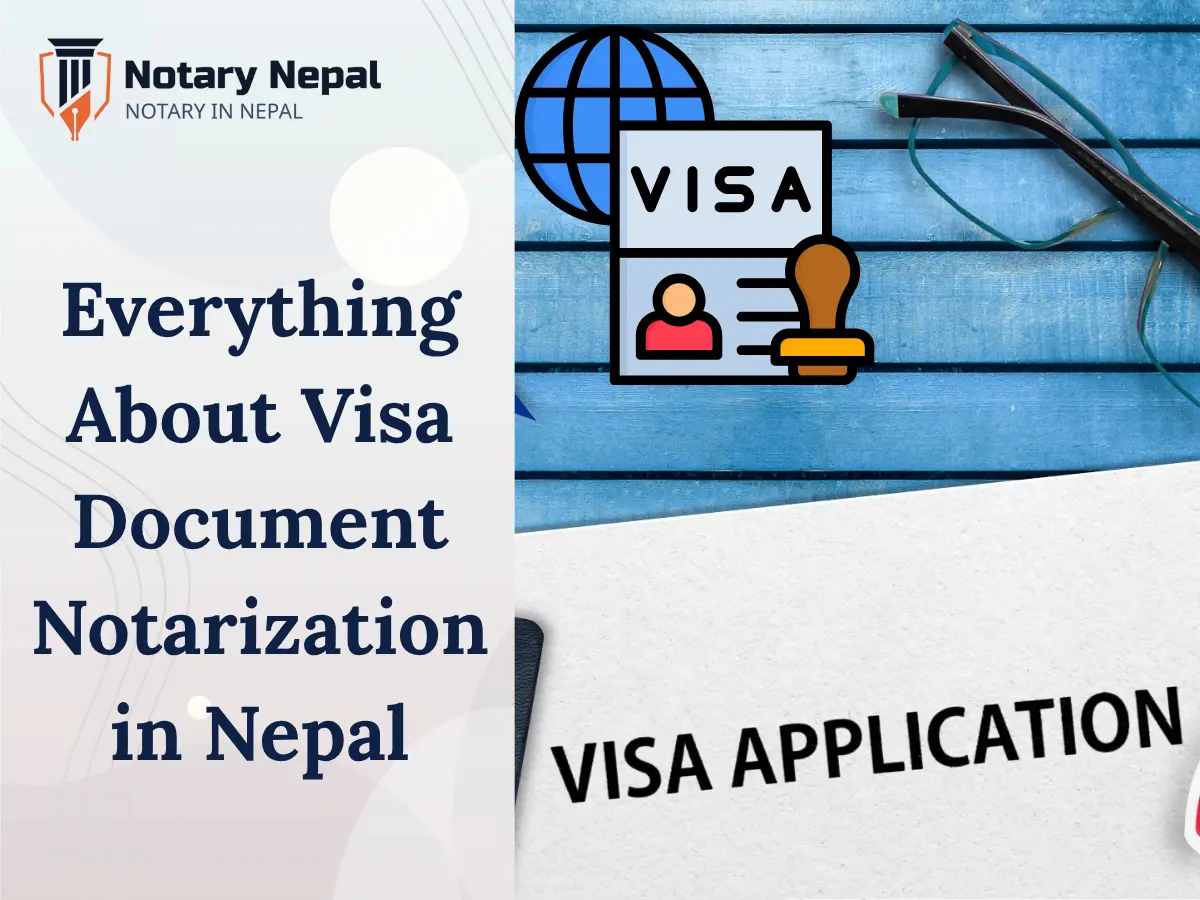

Table of Contents
Introduction
Are you preparing to apply for a visa from Nepal? Whether you're a student, businessperson, or traveler, ensuring your documents are legally notarized is a crucial first step. Visa document notarization in Nepal is essential for validating personal, legal, academic, and commercial papers required for international applications. In this comprehensive guide, we walk you through the entire notarization process in Nepal, the required documents, applicable visa types, and key tips to avoid costly mistakes.
What is Visa Document Notarization?
Visa document notarization is a formal process that certifies the authenticity of a document and the identity of the person signing it. A government-authorized notary public confirms that the document has been signed voluntarily and truthfully, making it legally acceptable for visa application.
Why is it Required?
Countries require notarized documents to:
- Prevent fraud
- Ensure legal reliability
- Confirm official translations
- Validate personal claims (like birth, marital status, education, etc.)
Documents That Commonly Require Notarization
1. Passport Copies
2. Birth Certificate
3. Marriage Certificate
4. Academic Certificates
5. Police Reports
6. No Objection Certificates (NOC)
7. Affidavits (single status, financial proof, guardianship)
Each of these documents must be either original or attested copy, and sometimes translated into English or another target language before submission.
Step-by-Step Process of Visa Document Notarization in Nepal
Step 1: Collect Required Documents
Organize all documents that need notarization. Originals are preferable.
Step 2: Translation (if applicable)
If the document is in Nepali and the target visa country requires English (or vice versa), certified translation is a must.
Step 3: Visit a Notary Public
Notaries can be found at:
- District Courts
- Private legal offices
- Online notary platforms
Step 4: Notarization
The notary public verifies your identity and signs the document with an official seal. A notarized copy is often made.
Step 5: Embassy Legalization or Apostille
Some countries require further verification:
- Embassy Attestation (for non-Hague countries)
- Apostille (for Hague Convention members)
Step 6: Final Submission to Embassy/Visa Center
Once all documents are notarized and legalized, they are ready for submission to the relevant embassy or visa processing center.
Who Can Notarize Documents in Nepal?
1. Registered Notary Publics
Licensed by the Nepal Notary Council, these are legally permitted to notarize documents for visa and legal use.
2. Advocates with Notary License
Legal professionals who hold both advocacy and notary licenses.
3. Online Notary Services
Platforms like Notary Nepal provide secure document notarization and optional translation services.
4. Embassy Notarization Units
Some embassies also provide in-house notarization for certain documents.
Translation and Notarization
Many visa documents require both certified translation and notarization. Notary Nepal offers both services, especially for:
- Academic transcripts
- Legal affidavits
- Birth and marriage certificates
Visa Types That Often Require Notarization
1. Student Visa
- Transcripts
- Recommendation letters
- Birth certificates
2. Work Visa
- Employment contracts
- Police clearance
- Experience certificates
3. Business Visa
- Business registration
- Investment documents
4. Dependent/Spouse Visa
- Marriage certificate
- Affidavits of relationship
Costs and Timeline
| Document Type | Estimated Cost (NPR) | Time Required |
|---|---|---|
| Notarization (per doc) | 500 – 1000 | 1 day |
| Translation (per page) | 300 – 700 | 1–2 days |
| Apostille Service | 2000 – 5000 | 3–5 days |
| Embassy Attestation | 3000 – 8000 | 5–10 days |
Costs may vary based on document length, urgency, and translation language.
Online and Emergency Notarization Services
Many firms now offer remote notarization through:
- Video verification
- Digital signature
- Email delivery of notarized documents
Notary Nepal provides emergency notarization with same-day delivery for urgent visa applications.
Common Mistakes to Avoid
- Not checking embassy-specific requirements
- Using uncertified translators
- Submitting expired documents
- Ignoring the need for embassy attestation
Case Study: Student Visa for Germany
Client: A Nepali student applying to a German university
Challenge: Required notarized translations of transcripts, police report, and birth certificate within a week.
Solution: Notary Nepal provided:
- Certified English translations
- Notarization
- German embassy attestation
Outcome: Documents submitted on time, visa approved.
Final Checklist Before Submission
- All required documents collected
- Certified translations completed
- Documents notarized with seal
- Apostille or embassy attestation done
- Copies made for personal records
Where to Get Help
Notary Nepal offers full-service notarization, certified translation, and embassy attestation support.
Office: Kathmandu, Lalitpur, Pokhara
Contact: +977 9765979296
Website: notarynepal.com
Conclusion
Visa document notarization in Nepal is a legal necessity for global travel, study, and employment. By following the proper steps—translation, notarization, and embassy legalization—you ensure your application is valid, complete, and timely. Save time, avoid errors, and trust experts like Notary Nepal to manage the process with accuracy and professionalism.
This article is for informational purposes only and does not constitute legal advice, advertisement, or solicitation. Notary Nepal and its team are not liable for any consequences arising from reliance on this information. For legal advice, please contact us directly.


